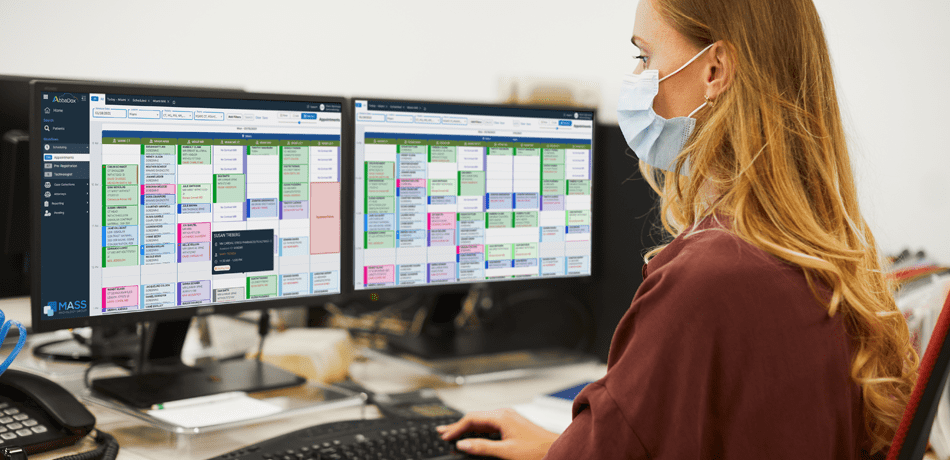It’s a question every practice manager is asking themselves, especially as practices aim to make up for missed appointments and lost revenue throughout the past year and a half. Eliminating bottlenecks in your workflows and optimizing patient scheduling will allow you to maximize your patient volume without compromising on care delivery.
With optimized scheduling and front desk workflows, your practice will experience a number of benefits. When done right, you will finally be able to:
- Provide more efficient care coordination
- Streamline scheduling and appointment confirmations
- Maximize patient flow and minimize no shows
- Enhance room and equipment usage/rotation
- Minimize physical paperwork and printing costs
- Reduce manual errors and time-consuming manual data entry
- Increase patient satisfaction
Are you ready to spend more time on patient care and less time on processes? Here’s how to eliminate inefficiencies and seamlessly streamline your radiology patient scheduling workflows.
Optimization, Integration, and Automation are the Keys to Optimized Patient Scheduling
1. Empower Patients to Self-Schedule
Scheduling is likely the most time and resource-consuming workflow at your diagnostic radiology practice. Is your front office staff spending hours scheduling and confirming appointments through manual phone calls and voicemails? If yes, it’s time you automate and simplify. Instead, empower patients to self-schedule and confirm appointments via patient portals and/or patient engagement solutions that connect and update in real-time with your scheduling software. This automation benefits both patients and staff. By streamlining and enhancing the way your office books appointments, you can redirect that time into better patient care while your practice will see a significant reduction in no–shows and cancellations.
2. Uncomplicate Multi-Facility Appointment Bookings for Patients, Referring Physicians and Staff
The process gets even more complicated when your administrative staff is booking for multiple facilities across multiple appointment types. In addition to creating inefficiencies, it also opens the door for a plethora of manual errors. Uncomplicate complex scheduling requirements by integrating all facilities into a scalable solution. Through centralizing scheduling, you can accurately time appointments, seamlessly schedule patients for multiple tests across facilities, and fill gaps immediately when cancellations occur. If your technology stack includes an integrated patient engagement solution for SMS, appointment reminders can be configured to take the guesswork out of the patient journey by sending timely messages that prepare them for and direct them to their next procedure.
3. Digitize Pre-Registration Workflows
You can’t live without the information, but you certainly can live without the physical paperwork. Patient intake forms are critical. However, when they are first filled out upon a patient’s arrival, it creates a major bottleneck that derails even the most perfectly timed appointment schedules. With a smart intake workflow, patients can have paperwork filled out entirely ahead of time. This e-paperwork can then be attached automatically to the record along with other key documents like identification and insurance cards. If this isn’t possible, at a minimum, your practice needs a system that can generate pre-populated forms that have patient and provider information already included.
4. Convert to All Paperless Referring Physician Orders and Faxes
If busy signals and mountains of paperwork are still the norm at your practice, it’s time you eliminate them once and for all. Automate and go digital with your referring physician orders and faxes to save your front office staff a tremendous amount of time (and frustration). Seamlessly attach key documents and orders to digital records and appointments. Missing information? With paperless workflows, standard fax back requests can happen instantly and automatically. This completely eradicates that common, yet unfortunate, triple threat of paper waste, lost documents, and unhappy referring physicians.
5. Prioritize Interoperability
A disjointed, multi-software framework almost immediately sets your practice up to fail before the first patient even walks through the door. Your technology stack can be the most advanced in the world, but it is limited by the way it connects (or doesn’t) with other systems. Multiple log-ins and various platforms that operate in silos are the cause of many inefficiencies at diagnostic radiology offices across the country. Your patient scheduling software and radiology information system should be one part of a powerhouse ecosystem that drives your practice forward without any missed opportunities in patient volume or satisfaction. When you use a vendor with a tightly integrated suite of applications and services that prioritizes a forward-thinking approach to network architecture and clinical data, your practice will benefit greatly from expanded capabilities in care coordination and practice management.
Bridge Your Patient Scheduling Opportunity Gap
While there may be many solutions on the market, the best (and only) option is a robust radiology information system that intuitively and automatically bridges the communication gaps between practice administrators, their operations, and their patients.
Are you ready to take your practice and patient experience to the next level? We have an entire cloud-based ecosystem that does all the work for you. Our AbbaDox radiology information system integrates modern patient engagement, patient record, eligibility, and billing solutions, all in one scalable, cloud-based platform your administrative staff never has to leave. It’s time your systems take care of your tasks so you can take care of your patients.
Click below for a personalized demo of our cloud-based patient scheduling and radiology information system solutions.

-1.png)







